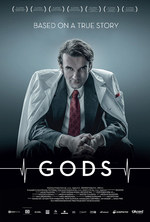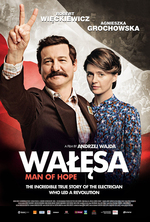Film Screening 11th September, 2015

Gods (Bogowie)
7:30 PM, 11th September, 2015
- TBC
- 120 mins
- 2014
- Lukasz Palkowski
- Krzysztof Rak
- Tomasz Kot, Piotr Glowacki, Szymon Piotr Warszawski, Magdalena Czerwinska
This screening of Gods is proudly presented by the Embassy of Poland
Last semester, stories about a theoretical physicist (Stephen Hawking in The Theory of Everything) and a codebreaker (Alan Turing in The Imitation Game) were turned into gripping cinematic experiences. Now be enthralled as you learn about Zbigniew Religa, the cardiologist who performed the first successful heart transplant in communist Poland in the 1980s.
Gods is a portrait of an extraordinary man who dared to challenge the existing rules under extremely adverse circumstances. The film does a great job in recreating Poland of the time. There are many squeamish medical scenes but when I overcame my fears and looked at the screen I was strangely intrigued by the magical workings of the surgeons. For me the medical terms made as much sense in the English subtitles as they did in the Polish dialogue but nevertheless had a mesmerising effect – I still got the ‘vibe’.
The film’s title comes from a scene where our doctor is berated by a hospital administrator after the death of an early patient: “You cardiologists think that you’re gods”, he says. There are failures along the way but, as Religa is told by a mentor, “without the courage to go forward, you’ll never get anywhere.”
With more dark humour than you might expect and an excellent soundtrack, Gods was the most successful film in Poland in 2014 and the winner of Best Film at this year’s Polish Film Awards. Make sure you come along and see the film in its exclusive Canberra premiere screening – only at the ANUFG!
Brett Yeats

Walesa: Man of Hope (Walesa. Czlowiek z nadziei)
9:40 PM, 11th September, 2015
- M
- 119 mins
- 2013
- Andrzej Wajda
- Janusz Glowacki
- Robert Wieckiewicz, Agnieszka Grochowska, Iwona Bielska, Zbigniew Zamachowski
This screening of Walesa: Man of Hope is proudly presented by Puma Media
Tonight will be a late finish but those of you who stay will be glad you did after seeing this enlightening history lesson.
The invasion of Poland by Germany on September 1, 1939 marked the start of World War II. At the end of WWII, Poland was a satellite state of the USSR. Poor standards of living caused by food shortages and price increases, combined with martial law and political repression, led to the rise of Solidarity, the first trade union not controlled by the Communist Party in any Warsaw Pact country. And at the forefront was Lech Walesa (Wieckiewicz).
Academy Award winning director Andrzej Wajda, Poland’s most prominent filmmaker, has a history going back to 1950 and is a man worthy of his own biography (check him out). In this film he blends archival footage into this human story about how civil resistance ultimately succeeded. Along the way Walesa faces imprisonment and all the dirty tricks that authorities can employ. Worse, how could soldiers and the police mistreat fellow Polish people in the way that they did?
Lech’s wife Danuta (Grochowska) is played with warmth and sympathy as she struggles to deal with her husband’s absences and to bring up six young children in very straitened circumstances. There is a happy ending: Walesa, a man “full of contradictions and surprises”, was awarded the Nobel Peace Prize in 1983. Democratic elections were held in 1989 and Walesa went on to become the second President of the Third Polish Republic from 1990 to 1995.
Brett Yeats